ORCID iD: Understanding Researcher Identifiers-An Interview with ORCID
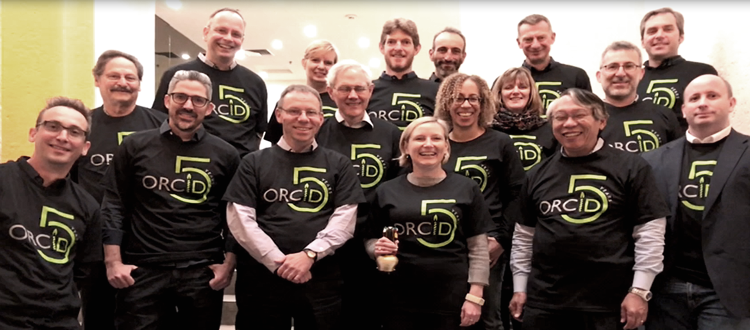
In academic research, sometimes finding the research study of a particular scientist can become a daunting task. This is mainly because many researchers might have the same name and therefore identifying the right person can become difficult. ORCID iDs help solve the issue of identifying researchers.
As of October 2017, ORCID has a membership of over 4,007,005. ORCID’s members include researchers; academic institutions such as Caltech and Cornell University; publishers such as Elsevier, Springer, Wiley, and Nature Publishing Group; academic societies; and funding bodies. In fact, the Wellcome Trust (a charitable foundation) has also begun to mandate that all applicants should provide an ORCID identifier in their submission.
Similarly, in several countries, consortia, including government bodies as partners, are operating at a national level to implement ORCID. For example, in Italy, universities and research centers under the Cineca project are driving the usage of ORCID. In Australia, the National Health and Medical Research Council (NHMRC) and Australian Research Council (ARC) are requesting researchers to provide an ORCID identifier in their applications.
As part of our interview series on Connecting Scholarly Publishing Experts and Researchers, we had the opportunity to speak with the ORCID team.
Could you give our readers a brief idea about ORCID?
ORCID is a non-profit organization which provides a persistent identifier for researchers—the ORCID iD. Our vision is a world where all who participate in research, scholarship, and innovation are uniquely identified and connected to their contributions and affiliations across disciplines, borders, and time.
We are open and community-driven, and grounded in ten key principles. We share our annual roadmaps and what we are working on in our public Trello boards. Our software is open source, and each year we share a file of all public data on the ORCID Registry. We solicit public suggestions for new features and improvements in our iDeas Forum, and we convene working groups to investigate issues including how ORCID iDs should be displayed and used in journals and books and the development of an organization devoted to providing organization identifiers.
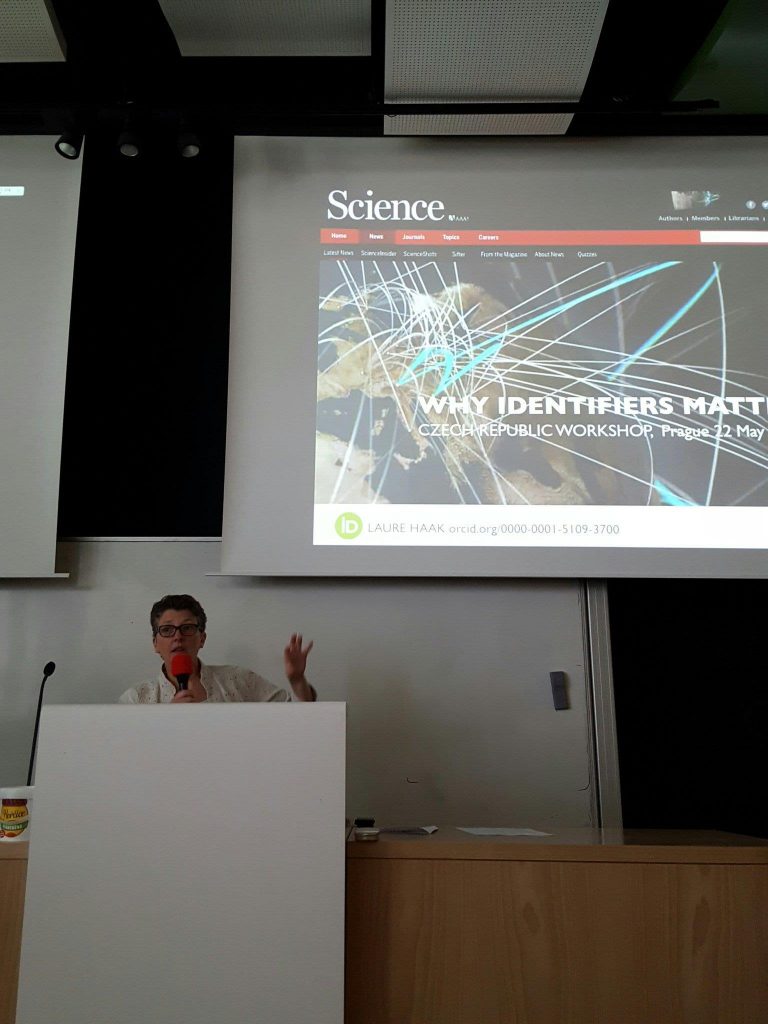
Executive Director Laure Haak ![]() presenting Why Identifiers Matter, May 22, 2017
presenting Why Identifiers Matter, May 22, 2017
https://twitter.com/ORCID_Org/status/866552269193584640
What is an ORCID iD, and how is it used?
As a researcher, your name is not enough to distinguish yourself in digital environments. That’s why the research community came together to create ORCID iDs: a persistent identifier that can be used to uniquely identify you and connect you with your research contributions and affiliations. The ORCID iD is a 16-digit identifier expressed as an https URL and often preceded by the green ORCID iD icon, for example:
![]() https://orcid.org/0000-0002-1825-0097
https://orcid.org/0000-0002-1825-0097
Researchers control their own ORCID iDs, including what information is connected to the iD, who can see that information, and who can add to and update it. You can connect your iD with systems that have integrated with ORCID, including institutional CRIS, repositories, and profile systems; publishers’ manuscript submission platforms; and funders’ application systems. You grant these systems permission to read and update your ORCID record, allowing the systems to import data from your record to fill in forms and to export data about your contributions and affiliations into your record. Your ORCID iD thus becomes linked to this information, making it easier to discover your work and automatically pull it into connected systems.
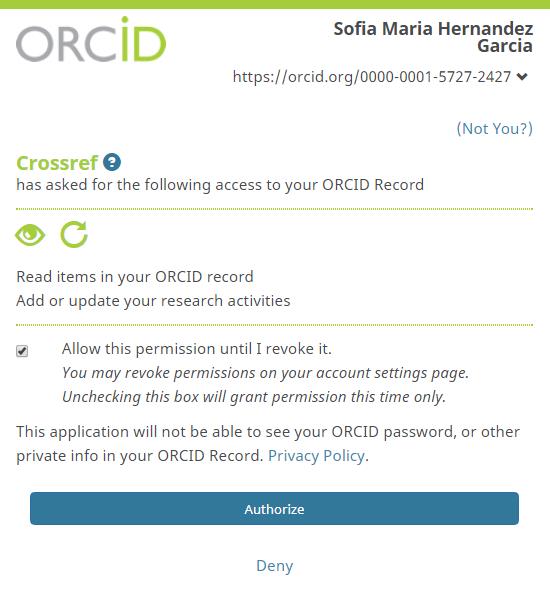
ORCID now has more than 800 member organizations all across the globe. Could you share some more details on these member organizations?
ORCID is supported by an engaged member community. Our more than 800 member organizations are located in 41 countries and on every continent save Antarctica. 75% of our members are research institutions, followed by publishers (8.1%), repository and profile organizations (5.2%), funders (4.6%), associations (3.7%), government organizations (2.8%), and others (0.3%).
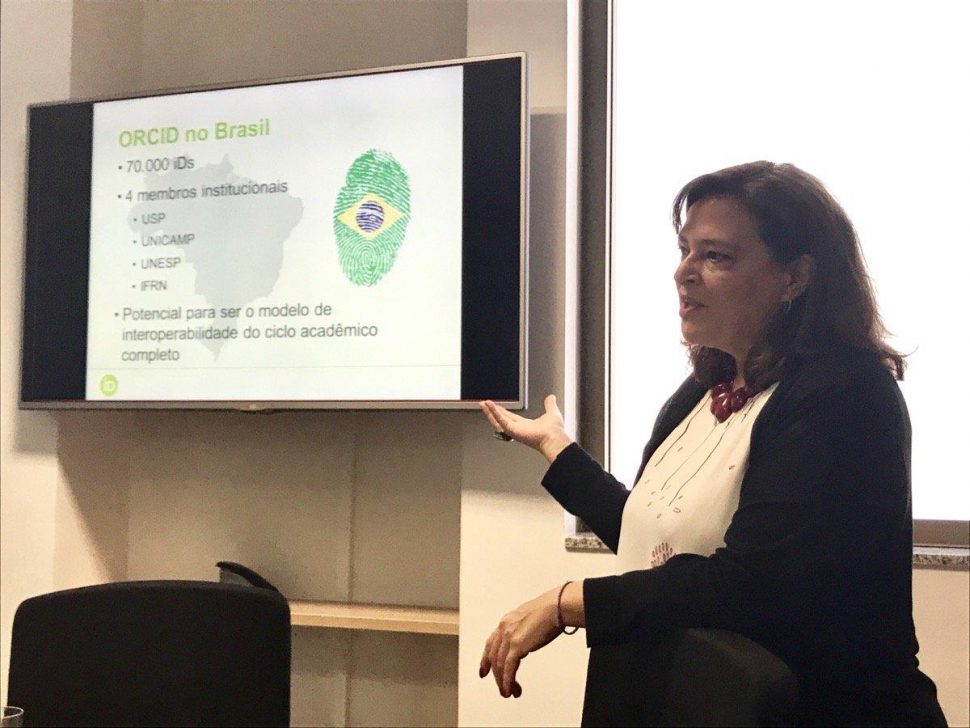
Regional Director, Latin America, Ana Heredia ![]() presenting on ORCID uptake in Brazil, June 23, 2017
presenting on ORCID uptake in Brazil, June 23, 2017
https://twitter.com/ORCID_Org/status/877959231139446784
Since its launch in 2012, ORCID has seen rapid growth. What are some of the recent achievements and major milestones for ORCID?
We recently celebrated our fifth birthday on October 16, 2017. Prior to our launch, more than 300 organizations had registered their support for our organization, and 50 of these provided start-up financial support. We now have more than 800 actively engaged member organizations. We also have recently celebrated the creation of the 4 millionth ORCID iD, and the 10 millionth unique DOI connected to an ORCID record. (Enjoy statistics? Find more on our stats page.)
What is the success of adoption and the impact that ORCID has had globally?
ORCID is a global service, and along with our international membership, our users also come from around the world. The highest number of users each month come from the United States and China, while users from the United Kingdom, Brazil, India, Germany, Australia, Spain, and Italy are consistently in our top ten. The ORCID Registry user interface and ORCID-related outreach resources are also available in multiple languages, with Chinese, Spanish, and Portuguese being the most commonly used after English. We welcome translation contributions in additional languages to support the global community.
Funders and publishers worldwide are increasingly requesting or requiring researchers to connect their ORCID iDs to their funding applications and manuscript submissions. National and international funding agencies use ORCID in their grants management systems, including the US National Institutes of Health, the UK Research Councils and National Institutes of Health Research, the South African National Research Foundation, Science Foundation Ireland, the Swedish Research Council, and the Australian Research Council and National Health and Medical Research Council. For more on publishers, see below.
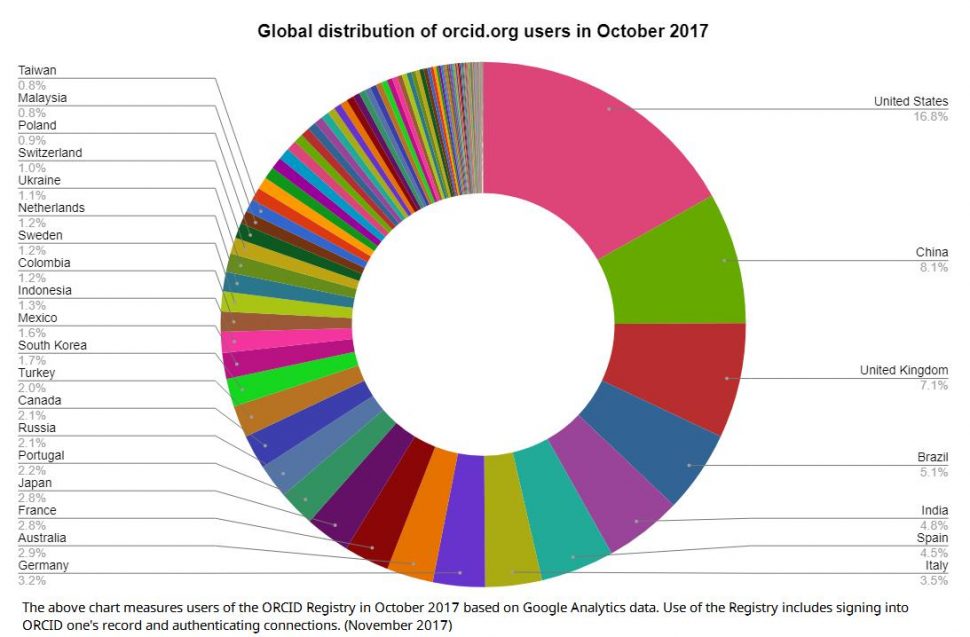
How do publishers and societies help drive the growth of ORCID?
In November 2015, a group of publishers asked ORCID to help facilitate communications about their plans to require authors to use an ORCID iD. Publishers signing the open letter have committed to requiring ORCID iDs following specific implementation standards: Collecting ORCID iDs by asking users to sign into their ORCID accounts to grant permission for the publisher to read the ORCID iD; displaying the ORCID iD in the journal article print and web view and in the article metadata. It also helps in passing the iD in the publication information that is sent to Crossref so that authors can benefit from having their ORCID records automatically updated when the article DOI is created.
The list of signatories to the letter has grown to 35 journals, publishers, and societies. These include major national and international publishers such as Springer Nature, Wiley, Science (US), Hindawi (Egypt), and Social Sciences Academic Press (China); international journals and publishers such as Nauplius (Brazil), Neural Regeneration Research (China), and Journal of Medical Internet Research (Canada); and societies such as the American Chemical Society, Royal Society of Chemistry, Grupo Comunicar Ediciones, the Institute of Physics, and the Japan Epidemiological Association.
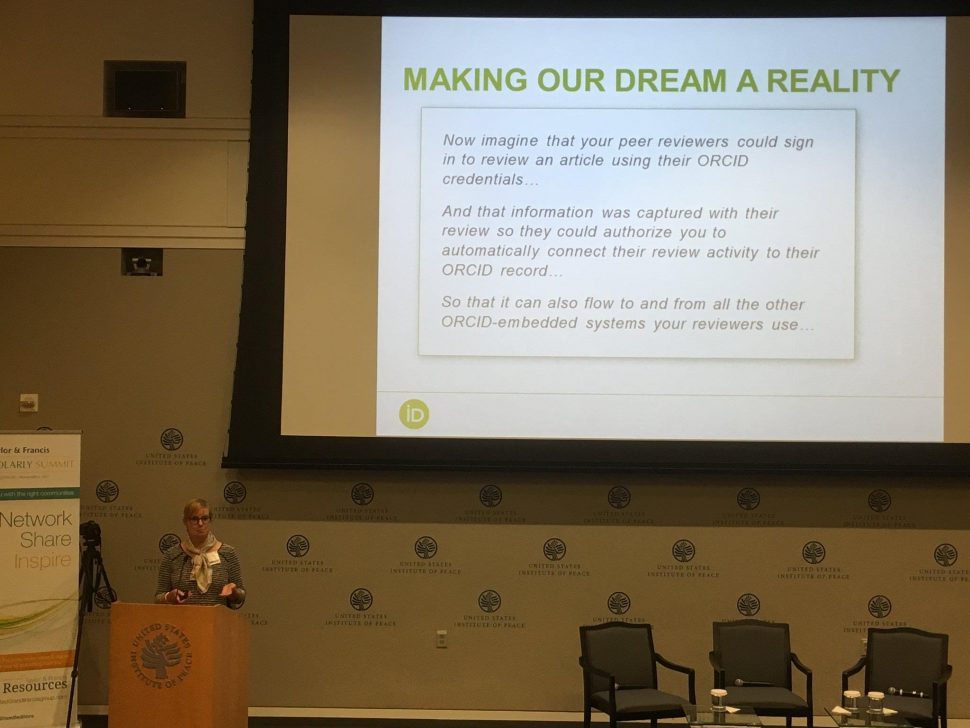
Director of Community Engagement and Support Alice Meadows ![]() sharing how ORCID can help peer reviewers manage and share their review activity, November 9, 2017
sharing how ORCID can help peer reviewers manage and share their review activity, November 9, 2017
https://twitter.com/TandFEditors/status/928333917886799873
Could you share some insights on ORCID’s 2017 Community Survey?
The 2017 ORCID Community Survey was conducted between May-July 2017. It was our second community survey—our first was conducted in 2015. A summary of the survey is available on the ORCID blog, and the full report and anonymized dataset are available in the ORCID repository.
We received 1,776 completed surveys from 2,517 respondents. Respondents were evenly distributed across the early, mid, and senior career stage with medical sciences and health (19.7%), life sciences (17.5%), engineering/technology (1.7%), social sciences (8.5%) as the top four disciplines—a similar distribution to those of the 2015 survey. The majority of respondents came from Asia (31.3%), followed by Europe (25.1% Western Europe and 6.6% Eastern Europe); and the US and Canada (13.7%).
More than half (54.6%) of respondents stated that they created an ORCID iD because their publisher (544), funder (227), or institution (233) required an iD. Other key reasons were to link all their publications under a common identifier and to make it easier for readers to find their work (ranked 3.5/4 and 3.46/4 respectively). The most common use of ORCID iDs reported was in publications workflows.
In 2017, 83.1% of respondents “strongly agreed” or “agreed” that ORCID is essential (as compared with 48.8% in 2015), and 85.9% of respondents agreed or strongly agreed that requiring the use of ORCID iDs is beneficial to the global research community (72.2% in 2015). Finally, the top five attributes respondents associated with ORCID are “open”, “global”, “efficient”, “easy to work with”, and “essential”.
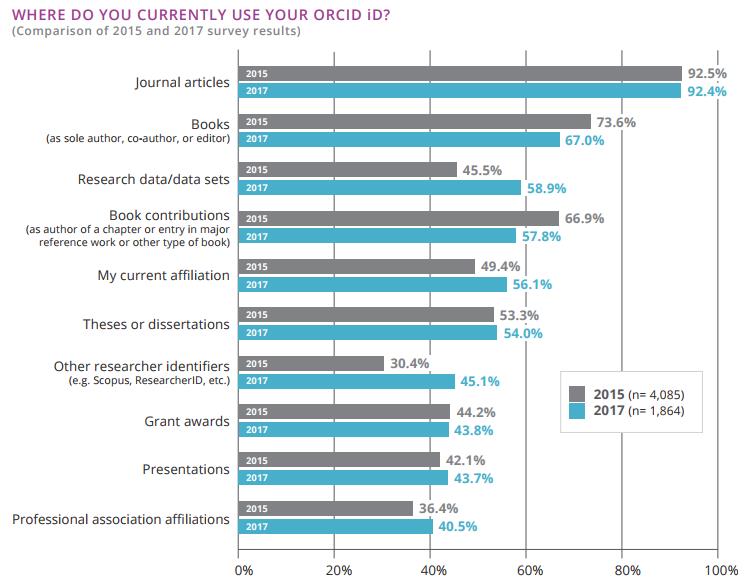
You can check out the ORCID website and blog for more information on the latest updates. You can also follow them on Twitter @ORCID_Org.
It was indeed a great pleasure to talk to the ORCID team. We sincerely thank them for taking the time to be a part of this interview and also wish them all the very best in their future endeavors!
(This interview is a part of our interview series of Connecting Scholarly Publishing Experts and Researchers.)




